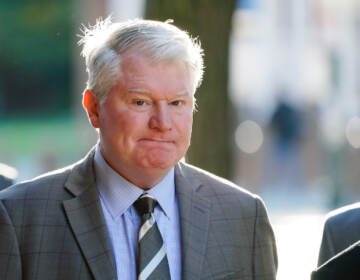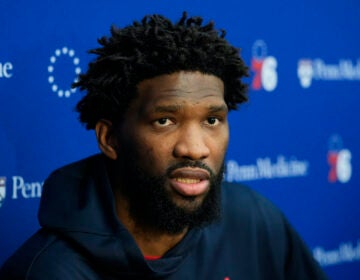Eco-friendly innovators tell Germantown forum attendees how easy it is to be green
A diverse panel of local innovators shared details of their eco-friendly urban projects at Germantown United Community Development Corp.’s second annual community forum on Wednesday night.
The “It IS Easy Being Green” event drew a large crowd to the Flying Horse Center on Pulaski Street near Chelten Ave. in Germantown.
Before the panel discussion, attendees perused a “trade show” of tables from groups including Awbury Arboretum, the Bicycle Coalition of Greater Philadelphia, the John B. Kelly School’s “Kelly Green” grounds initiative, the Philadelphia Streets Department and the Sustainable Business Network.
Molly Finch, an educator with the Tookany-Tacony-Frankford Watershed, passed out small packets of sunflower seeds and suggested “guerrilla planting” for those without their own gardens.
“Stuff like this,” she said of the forum, “should be happening more often.”
The keynote address
GUCDC Board President Andy Trackman introduced moderator and keynote speaker Robert Fleming, associate professor of sustainable design at Philadelphia University.
Fleming, who co-founded the university’s Engineering and Design Institute and its sustainable-design Master’s degree program, led his remarks with childhood memories of Maplewood Mall and Mt. Airy.
Fleming, who also works as an LEED-accredited consultant to firms designing green buildings, showcased real-life statements he encountered from business owners in the nineties.
Vignettes included statements like “the Internet is too slow; it’ll never catch on,” and firms that insisted they didn’t need e-mail or websites because they had telephones and fax machines.
He compared those to naysayers claiming that “green” buildings will never catch on.
Greening strategies
Fleming then referenced a series of events that have left people with a fearful eye for the future, environmental or otherwise. Those included Hurricane Katrina, the Indian Ocean tsunami of 2004, the BP oil spill, the Fukushima nuclear disaster and Hurricane Sandy.
Fleming said those pressing problems leave him wanting “a more holistic view of what sustainability can be,” noting that Abraham Maslow’s hierarchy of needs should be a model for viable greening efforts.
Specifically, he said that clean air, water and good food should underlie diverse and inclusive communities with strong economies. To top it all off, “green” efforts must be artfully crafted, to satisfy a human need for beauty, Fleming maintained.
Panelists speak
Seven panelists then shared a range of projects with the crowd.
Christine Knapp, director of strategic partnerships at the Philadelphia Water Department, spoke about the problem of urban storm-water management.
She explained the difference between “combined” sewer systems (comprising 60 percent of Philadelphia’s sewers) which cause dangerous overflow when sewage and stormwaters mingle, and “separate” ones, which help prevent flooding by giving sewage and storm-water different underground pathways.
Knapp touted solutions like rain barrels, rain gardens, roof plantings, porous pavement and increasing the number of trees planted in the city as efforts that would beautify as well as tackle sewer woes.
Obesity and re-entry
Representing the Food Trust, Dwayne Wharton pointed to a small drop in the obesity rates of city youth.
That reduction followed a range of healthy food-access initiatives like eliminating soda drinks and fryers in school cafeterias and a proliferation of city farmers’ markets that accept SNAP benefits.
The purpose of those moves was to “make the healthy choice the easy choice,” Wharton said.
Kelly Maillie, an AmeriCorps intern with the Philadelphia Horticultural Society, described a program called “Roots to Re-Entry” which trains Philadelphia Prison System inmates in food growing and landscape management.
The program, which also helps with former inmates’ job placement, was sparked by PHS’ City Harvest and currently helps to feed about 1,200 needy families per week.
Rockland Street, graffiti and storefronts
From there, Germantown sisters Aine and Emaleigh Doley spoke about their “West Rockland Street Project” which, without the help of any official structure or umbrella supporter, has revitalized a block of Southwest Germantown.
The neighborhood activists spoke about their successful efforts to remove blighted buildings, reduce dumping, build gardens, foster community engagement and even increase voter registration through a string of targeted events and initiatives.
Germantown artist and muralist Zack Bird shared his efforts to cover rampant graffiti on the Wissahickon’s stately stonework.
His before-and-after photos demonstrated that a sealed faux-finish, done with discarded house paints, can restore the appearance of stone without the costly and damaging removal work of sand-blasting.
Vivian Nabeta, who serves as New Haven, Ct. director of arts, culture and tourism, shared that city’s successful “Project Storefront” program, which livens up corridors by helping artists and entrepreneurs get into formerly vacant retail spaces.
Audience reaction
A question-and-comment session extended the conversation to littering, current legislation to consolidate buyers’ access to vacant lots owned by different city agencies, tax delinquency and school programs for healthy cooking.
Not everyone in the audience was enthused by the presentations.
One attendee complained that Philadelphia has “one of the laziest, most corrupt” city governments in the world. Another took issue with the “Roots to Re-entry” presentation, pointing out the negative racial overtones of African-American inmates doing the “agrarian” work showcased in the photos.
However, Fleming closed by praising the panelists’ “ability to work across disciplines and check your ego at the door.”
In advising those interested in sustainability to remember “baby steps and dandruff,” Fleming noted that positive action happens one small project at a time and, as with pesky dandruff, “brush off those who say it can’t be done.”
WHYY is your source for fact-based, in-depth journalism and information. As a nonprofit organization, we rely on financial support from readers like you. Please give today.




